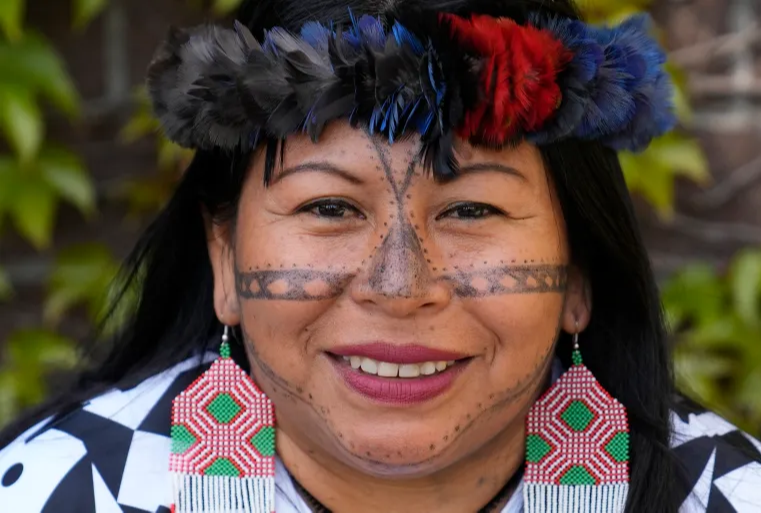
Alessandra Korap is one of six recipients of the 2023 Goldman Environmental Prize for grassroots activism.
Brasilia, April 25 (RHC)-- When Alessandra Korap was born in the mid-1980s, her Indigenous village, nestled in the Amazon rainforest in Brazil, was a haven of seclusion. But as she grew up, the nearby city of Itaituba crept closer and closer, with its bustling streets and commercial activity.
It was not just her village feeling the encroachment of non-Indigenous outsiders. Two major federal highways paved the way for tens of thousands of settlers, illegal gold miners and loggers into the region’s vast Indigenous territories, which cover a forested area roughly the size of Belgium.
The influx posed a grave threat to Korap’s Munduruku people, 14,000 strong and spread throughout the Tapajos River Basin in Brazil’s Para and Mato Grosso states. Soon illegal mining, hydroelectric dams, a major railway and river ports for soybean exports choked their lands — lands they were still struggling to have recognised.
Korap and other Munduruku women took up the responsibility of defending their people, overturning the traditionally all-male leadership. Organising in their communities, they orchestrated demonstrations and presented evidence of environmental crime to Brazil’s attorney general and federal police. And they vehemently opposed illicit agreements and incentives offered to the Munduruku by unscrupulous miners, loggers, corporations and politicians seeking access to their land.
Korap’s defence of her ancestral territory was recognised with the Goldman Environmental Prize on Monday. The award honours grassroots activists around the world who are dedicated to protecting the environment and promoting sustainability.
“This award is an opportunity to draw attention to the demarcation of the Sawre Muybu territory,” Korap told The Associated Press news agency. “It is our top priority, along with the expulsion of illegal miners.”
Sawre Muybu is an area of virgin rainforest along the Tapajos River spanning 178,000 hectares (440,000 acres). Official recognition for the land, or demarcation, began in 2007 but was frozen during the far-right presidency of Jair Bolsonaro, which ended in January.
Still, the Munduruku people celebrated a victory in 2021 when the British mining company Anglo American gave up trying to mine inside Indigenous territories in Brazil, including Sawre Muybu.
Almost half of Brazil’s climate pollution comes from deforestation. The destruction is so vast now that the eastern Amazon, not far from the Munduruku, has ceased to be a carbon sink — a net absorber of the gas.
Instead, it is now a carbon source, according to a study published in 2021 in the journal Nature.
In the neighbouring Munduruku Indigenous Territory, illegal miners have destroyed and contaminated hundreds of kilometres of waterways in search of gold, even though it was officially recognised in 2004. Now Brazil’s new government has created the country’s first Ministry of Indigenous Peoples and, more recently, mounted operations to drive out miners.

